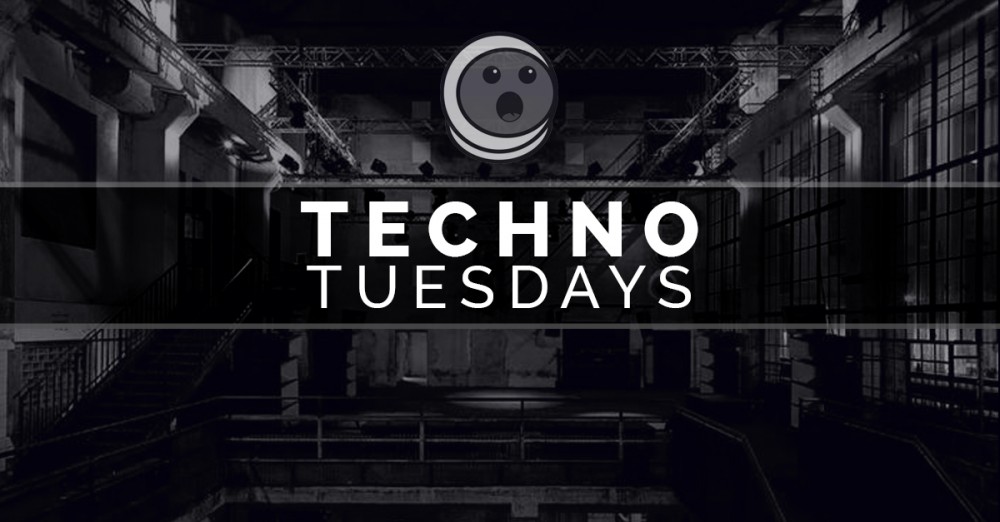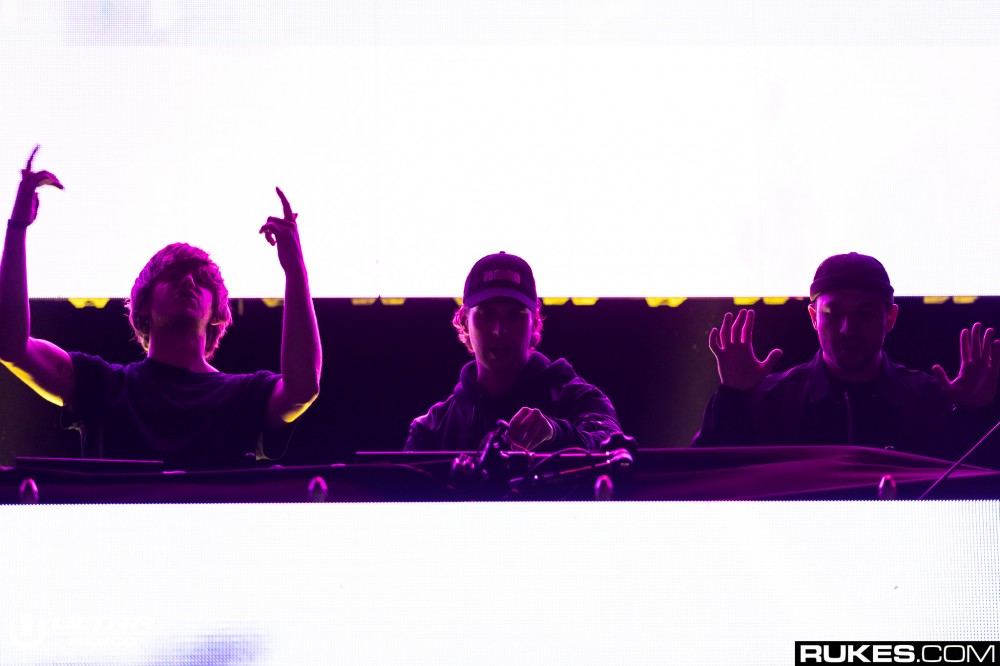
Techno Tuesday: UMEK on returning to his roots, 1605's revival, and the future of music in the digital age
Techno Tuesday is a feature on EDM All Day documenting the culture of underground dance music. We’ll bring you exclusive interviews, tracks, and narratives from artists within the techno, tech house, and deep house world in an effort to shed light on some of the best talent outside the world of mainstream dance music.
UMEK’s career began in techno. The Slovenian talent became a driving force of his country’s underground scene at the turn of the millennium, throwing often-times illegal parties under the shadow of the late night hours. After exploring the vast sea of styles elsewhere on the dance music spectrum, he eventually felt the call to return to his roots around a half-decade ago and has since been undergoing what some might call a creative renaissance. He re-launched his label 1605 earlier in 2019 after a two-year break, and has since continued to steep himself deeper into the underground realm, where he’s always felt at home.
Accordingly, the latest EP in UMEK’s collection lands on 1605, and as one might expect, it’s quite the heavy listen. That being said, duality is present in Vigilance; the producer opens on an unrelenting note in the blistering title opener, but scales back a bit into tech house territory with “Keep It Bustin’.” That being said, the B-side maintains the weight and low-end impact to match the energy coming out of the preceding track. Vigilance marks the 4th EP of the year for UMEK, with the previous three landing on his freshly re-vamped 1605, and the first on Coyu’s esteemed Suara. It will be quite interesting to see where this path leads.
EDM All Day has yet to talk shop with the busy producer during this new era of his legacy, and so we’ve decided to invite him onto this week’s Techno Tuesday. A catchup unfolds, where he provides deeper insight into his current inspirations, bringing 1605 back into the fold, and of course, Vigilance.

Thanks for joining us, UMEK. Let’s dive straight into your latest EP ‘Vigilance.’ These tracks really encompass your tech house and techno sides; was the duality in your choice of track pairing intentional? And, what inspired each track?
To be honest, I don’t think this EP has to do anything with tech-house at all. One track is very percussive and the other is leaning a bit on a melodic side, but they are both pure techno productions. It’s been quite a while since I’ve produced the last track that could be considered tech-house. When I produce music, I really don’t think much about how it will be pigeon-holed, I just try to express my feelings through music. What inspires my DJing and production is the energy that I feel from the dancefloor. I always try to capture some of that energy in my music and when I work on new projects, I think of what reactions will particular sound or combination of sounds trigger in the club or at the festival, when it’s played. I produce music inspired by the dancefloor, for the dancefloor for some quarter of a century now and it seems this approach works well for me.
You’ve been diving back into techno as of late, where your roots lie. Why make the transition now?
It has been at least three if not four years now that I’ve developed my new sound and shifted completely to techno. It took me more than a year to get where I wanted to be, but after I’ve developed my new sound, I’ve had a magnificent string of releases. The last 20 or even 25 releases I’ve made have defined my current sound and after some time I can finally say that I do have a characteristic sound.
Have you been inspired by others who have been doing the same?
Yes, but that’s something that happened unplanned as it constantly does. I am buying a lot of music. I basically buy everything I like regardless of genre. And I was not even aware of the fact that the scene has started to shift from tech-house to techno at some point, but then I’ve started noticing that I’m buying more and more techno records, so my sets were less house and tech-house infused, getting harder, rougher and a bit faster at the same time. It was then that I also got bored with the sound of my own production, so I’ve bought a bunch of new tools and started developing something fresh. It took me much longer than I’ve expected as I got stuck at some point and could not create anything that sounded just the way I wanted. But after some year and a half I finally got everything the way I wanted and from that point on my releases really started to stir attention. My coping mechanism is that I intentionally try not to check in detail what other producers are doing, as I don’t want to get influenced too much. Since I have set my current sound, I’m trying to keep it. I try new stuff all the time, but I don’t want to digress too much to the left or right from my path. I like where techno is going right now and I feel very comfortable where I am as a DJ and producer.
What is it about techno as a genre that you feel gives you the space to innovate?
Let’s be honest – there aren’t any groundbreaking innovations in techno right now, most of the things were defined and developed years ago. Sure, there are little improvements that drive the scene forward, but the scene needs more and more time to offer something really innovative and refreshing. We live in the age of fusion with other styles and genres. Some like it and some don’t, but just recently there were four techno tracks in top ten best-selling tracks on Beatport and all four were quite melodic. For quite some time I could feel techno producers are incorporating more trance-like melodies into their tracks and now this sound has really peaked. In the last two or three years there was a lot of acid techno, of which DJs and audience are now getting bored and consequently there’s more room for other subgenres. The biggest innovations in electronic music nowadays are technical, not creative. With new machines, the sound is getting better and better but at the same time that can also mean everything is starting to sounds very clinical, emotionless. Don’t forget: I broke through in the 90s with the sound that was technically full of little faults and mistakes, but that made it primal, interesting and unique. If everything was so precise and clean sounding as most of the modern production, I’m not sure I’d had developed something so special. What we do right now is that we introduce classic techno sound to a new generation of ravers, tweaking it a bit so that it sounds contemporary and fresh. Trance melodies in techno are nothing new, but it’s been a while since producers ‘were allowed’ to use them, as music works in cycles and there were other shades of techno sounds that were trendy in the last decade or so: from minimalism and tech-house to acid and now melodic techno. Bart Skills’ remix of Push’s Universal Nation that is on the top of Beatport techno chart right now is a rework of 20 years old trance anthem, for example.
You also revived 1605 after a two year break. Can you expand on your new vision for the label?
There’s not too much philosophy behind it. I’ve developed my new sound and strengthened it with releases on other labels in the last couple of years, and at the same time the Viberate project has come to the point where my team members can dedicate more time to the label again, we’ve decided to revive 1605. Till now we only released my own productions, but now that everything is running smoothly again, I might be open to sign some releases from other artists as well, but nothing is set in stone yet, so this will only happen in case I’m offered something that I’ll really like.
On the note of 1605’s makeover, one of the tenets was transitioning entirely to digital. With the vinyl revolution currently unfolding with a sharp increase in interest and sales in this medium, do you see yourself opening that part of the label again in the future? Why or why not?
We actually don’t have any strict policy regarding formats for 1605. In the past we released most of the productions digitally and selected bestsellers were also available on vinyl. If there’s demand for it we might do that again in the future, but I am really not sentimental when it comes to vinyl. I believe the spike in vinyl sales should be at least ten times bigger than it is for the artists to be able to make real money from selling music on vinyl and to state people are really using this format. The next release of my Zeta Reticula side project will be available only on vinyl, so I’m not abandoning this format completely, but at the same time I do think today’s vinyl isn’t really much more than a fashion accessory. Just check the Instagram: vinyl, unplugged old compressors, analog synths and equalizers are just a nice trick to gather likes. Couple of years ago there was a big spike in vinyl sales, but it turned out people have only bought a couple of hundred thousand copies of remastered classic rock albums. If only a couple of releases can cause such a big spike in sales, that means the vinyl market is actually very shallow. I also can’t say that I see more DJs playing vinyl again – I’d say that only one of every hundred DJs are playing digital formats.
Last year you helped kick off Viberate, a crypto currency-based marketplace. How’s that venture been going so far? What changes and improvements have you seen in this space since kicking off Viberate?
Well it’s been a bit more than a year, but yeah, we are growing like crazy. When we started, we had 5 people working on the project, now we have over 110 full-time employees in Ljubljana and across the world. Right now, we are presenting Viberate.com on TechCrunch Disrupt in San Francisco. We now feature over a million of profiles of artists, venues, events and festivals and we are steadily going towards fulfilling our vision – to become a standard for the live music industry, listing and mapping the entire ecosystem. Soon, artists won’t use their personal websites anymore – they will get replaced by their Viberate profiles. I’m already using my profile more often than my website.
Who are a few artists you’ve taken a likening to lately that we should be keeping our eyes on?
Huh, that’s one question that I really don’t like as that changes daily, so don’t hold it against me, but I’ll skip this one.
You’re still producing completely in the box, correct? What have been some developments on the digital production front, such as plugins or other software bits, that have really excited you as of late? Which have you been using a lot in your recent productions, and how have they helped boost your creativity?
You’ve just caught me elbows deep in Ableton. I’m studying it thoroughly and I’m working on my first releases that will be produced completely in this setup. Approach to producing music in Ableton is a bit different than in Logic and I guess that’s the main reason that music produced in this program sounds just slightly different. Some might argue that this doesn’t matter, but I use certain tools differently with one or the other sequencer: separators, equalizers… every tool is a bit different, though I still have to finish my first track in this environment to hear how much difference there will be in the final result. From time to time I like to throw myself out of my comfort zone and changing my studio setup usually helps me to refresh my sound a bit. I’m always dissatisfied with my sound and I’m trying to find a way to make it better, so I test everything that is available on the market. And I get bored of everything very fast, so I like to try new tools and approaches to producing music all the time. Now I’m thinking of putting together a tutorial for fine-tuning drum kicks in Ableton. Mindset of people who have produced this program is a bit different and the consequence of that are some solutions that demand different approach to producing certain things in music. As I’ve said, I’m totally hooked on their approach to producing kicks right now. Some solutions and ideas behind them are so unbelievably simple, but very effective at the same time.
What’s next in your pipeline?
I’ve already mentioned vinyl release of my electro side project Zeta Reticula and I have two UMEK EPs set up for the release, one on my 1605 label and the other will come out on one of the labels I’ve been working with closely for some time now. I’ve also really enjoyed spending some time creating a bootleg remix of one of my favorite classic tracks, Quench’s ‘Dreams’ from 1993. I don’t know if we’ll be able to clear the rights for the official release, but this was one of my favorite early trance tracks and I wanted to do my own version of it to play it in my DJ sets, so sharpen your ears and share your thoughts on how you like it.
Order a copy of ‘Vigilance’ here


